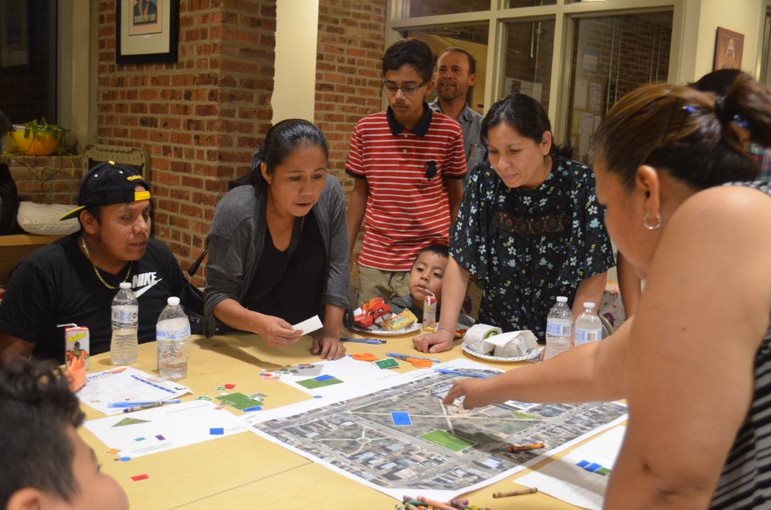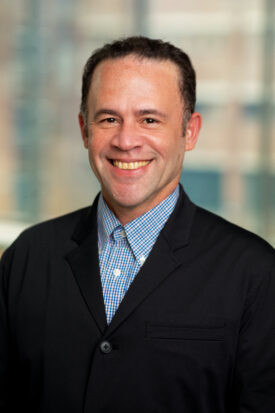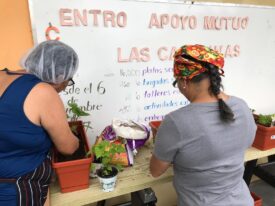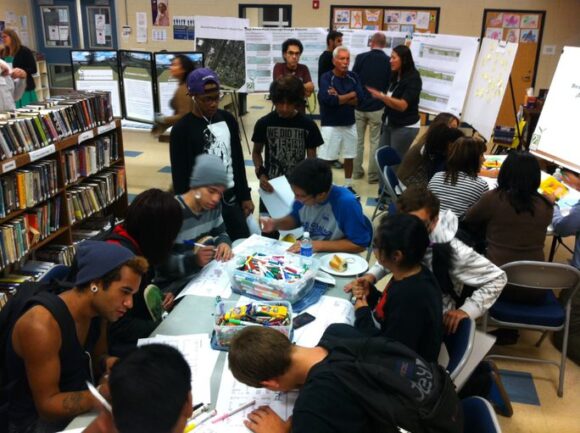
Community workshops at the Paul Robeson Community School in New Brunswick as the Feaster Park project got underway.
During Hispanic Heritage Month, we take the time to recognize and celebrate New Jersey communities that share a common language. The educational programs and activities that Rutgers provides to support health and well-being requires also the recognition of the rich diversity of New Jersey residents.
Richard Alomar, director of the Office of Urban Extension and Engagement and associate professor in the Department of Landscape Architecture, knows firsthand the responsibility of serving our diverse communities and to do so in the neighborhoods in which they live.

Richard Alomar.
Through his role with the Office of Urban Extension and Engagement, part of the Rutgers New Jersey Agricultural Experiment Station, (NJAES), Alomar works to create awareness about the expertise and resources available within NJAES and the School of Environmental and Biological Sciences (SEBS) to address issues affecting urban residents and their communities. The office coordinates and facilitates programming to address food security, individual and community health, resource stewardship, urban agriculture and food chains, environmental planning and design, and other concerns facing the state’s urban communities.
“We serve best by understanding the conditions and needs of our diverse populations. That requires adapting to different languages, customs and learning,” says Alomar.
“Our success is due in great part to our ability to support our faculty, extension agents and specialists as well as community partners in developing ways to recognize, engage and share information,” he adds.
Alomar’s heritage allows him to connect with and understand intuitively the Hispanic community. Although he was born in New York City, he attended high school and college in Puerto Rico, earning an undergraduate degree in agronomy from the University of Puerto Rico at Mayaguez. He is a registered landscape architect and has worked on public projects ranging in scale from urban planning to community gardens and has won international competitions for landscape designs.
“Language may unite Hispanics in New Jersey but social, economic and environmental concerns unite us all. We find ways to address these issues, together,” stresses Alomar.
He shared with SEBS/NJAES Newsroom three projects in which he and several Rutgers colleagues were deeply involved that engaged communities united by language, “but also by a desire to live better lives in a better world.”
 Las Carolinas Community Garden
Las Carolinas Community Garden
In the spring of 2019 a team of Las Carolinas residents in Puerto Rico and partners within the University of Puerto Rico, RWJBarnabas Health and Rutgers, initiated a garden program that addressed food insecurity in the community. The project invigorated a sense of empowerment and resiliency among the many Puerto Ricans who still struggle to cope in their forever-changed, post-Maria environment. The hope is to reinitiate the work when better times prevail.
“Our meetings were followed by lunch, made with the same ingredients my mother and grandmother used. The participants shared stories in a familiar voice and cadence, giving us much more than food and words, and much more than what we provided in advice.”

Community members engage in outreach efforts for the design of the Perth Amboy 2nd Street Park.
This project is a collaboration among SEBS, the Alan M. Voorhees Transportation Center at the Bloustein School of Planning and Public Policy, the City of Perth Amboy and Mayor Wilda Diaz, and the Middlesex Community Improvement Agency. The community design project relied on an extensive program of school presentations, community design workshops and public presentations to gather feedback and design a park based on community input and needs. Concept designs of what the park would look like were made based on the feedback from the community. The park is planned to open in the Spring.
“Residents and school children who participated in the many presentations and workshops could easily explain the park design in Spanish and English.”
Feaster and Pittman Parks Community Design
The Trust for Public Land, SEBS and CUES began conducting interviews with key New Brunswick city departments, local community organizations, and school leaders about the parks as the first phase of an in-depth public outreach campaign. Community workshops at the Paul Robeson Community School for the Arts and Unity Square gave community members the tools to create new park layouts using design element templates. The workshops were delivered in English and Spanish and all the materials were printed in both languages.
“The families that came to the workshops requested water as well as fresh veggies and fruits, something they learned to ask for after attending other Extension workshops on healthy eating.”

